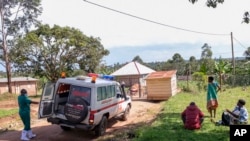Ugandan health authorities have confirmed nine cases of the Ebola virus in the capital, Kampala. The Ministry of Health says it has increased vigilance and set up an isolation center as confirmed cases in the country jumped to 90, with 28 deaths. The Uganda Medical Association says health workers are facing challenges getting patients into isolation.
In a tweet Monday, Health Minister Jane Ruth Aceng confirmed that Kampala had recorded 14 positive Ebola cases in the last 48 hours. All have the Sudan strain.
Ministry spokesperson Emmanuel Ainebyoona tells VOA the public needs to know that Ebola is now within close range, with contact numbers in Kampala now above 1,800.
“There is Ebola in Kampala, without a doubt. The beauty is that we have already an isolation facility at Mulago," said Ainebyoona. "We are setting up in the playing field at Mulago. We have an isolation facility in Entebbe. And most of the people testing are contacts who have been in our isolation and quarantine.”
In Aceng’s tweet, she asked Ugandans to report themselves if they or a person they know had contact with an Ebola patient.
But health care workers around the country say they are facing obstacles.
Dr. Sam Oledo, president of the Uganda Medical Association, says the public’s habit of seeking local remedies and treatment from herbalists remains a challenge and places health workers at risk.
“If you’re a contact of someone who is under isolation, report yourself, other than you hiding and predisposing everyone," said Oledo. "But now, the community members are the ones to help us to report to authorities which herbalist, which African traditionalists is seeing patients.”
The government is currently in the process of recruiting nearly 1,500 additional staff to combat the Ebola outbreak.
The Ebola Sudan strain currently has no proven effective vaccine. Uganda has received supplies of two trial vaccines — the Oxford vaccine from the United Kingdom and the Sabin vaccine from the United States.
But authorities are waiting for clearance from medical investigators before rolling them out to the public.





